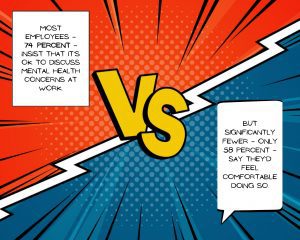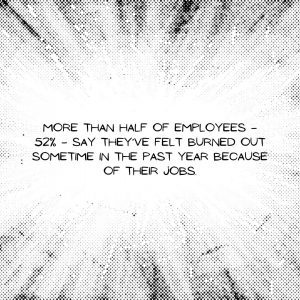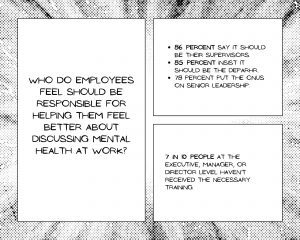A new National Alliance on Mental Illness survey reveals that a massive number of employees want to talk about mental health. Those employees also back more mental health training at work.
The Ipsos poll also exposes a disconnect between employer-provided mental healthcare coverage and the employees it’s supposed to protect. The results suggest a demand for better communication for the coverage to make more of a difference.
“This poll shows that, without a doubt, today’s workforce wants their employers to care about their mental health – by talking about it, giving training on it, and providing support for it,” NAMI CEO Daniel H. Gillison Jr. explained in a press release.
Employees Want to Share – Until They Don’t

What makes employees uncomfortable? Most worried about the stigma of admitting to a problem or incurring the judgment of their co-workers, or worse, their bosses. Others felt compelled to remain silent since everyone else seemed to be doing the same. A smaller minority remained anxious about appearing weak.
This gap between the perceived appropriateness of discussing mental health and willingness to personally share about it at work suggests a disconnect between the need for more awareness and education.
Most Employees are Burning Out
Employees struggling with their mental health – and aren’t comfortable discussing it with anyone at work – are more likely to report feeling burnout, according to the research. And it’s taken a toll on their mental health.

But they’re not alone. A lack of resources from upper management strains the mental health of their managers, too. Younger employees – those under 50 – and their female co-workers – struggle the most with burnout.
This echoes earlier research into workplace mental health trends.
“Nearly six in 10 employees are quietly quitting,” a Gallup “State of the Global Workplace 2023 Report” explained, “but they’re likely to become engaged with a few changes to their workplace.”
Managers Desperate for Mental Health Training
Four in five (83%) employees agree mental health and well-being training is critical to a better workplace culture. And those employees rank mental health training at the top of the list.

Finally, roughly half of managers – 51 percent – admit their organization offers or mandates mental health training and other resources. According to NAMI, this presents a huge opportunity for employers to do more.
Building a Better Workplace Culture
Almost all of those surveyed – an impressive 92 percent “share the sentiment that employer-sponsored mental health coverage is, or would be, important for creating a positive workplace culture.” But, one in four of those Ipsos polled confessed that they don’t know if their employer’s health plan includes mental health coverage.
The bottom line is that companies with mental health coverage have employees empowered to bring up the topic at work.
“We have to do more to create environments that are safe and supportive to address this mental health crisis,” Gillison concluded.
Further Reading
Work Hours, Sleep Sufficiency, and Prevalence of Depression Among Full-Time Employees
Insomnia & Absenteeism at Work – Who Pays?
The Economic Impact of Bipolar Disorder in an Employed Population From an Employer Perspective



